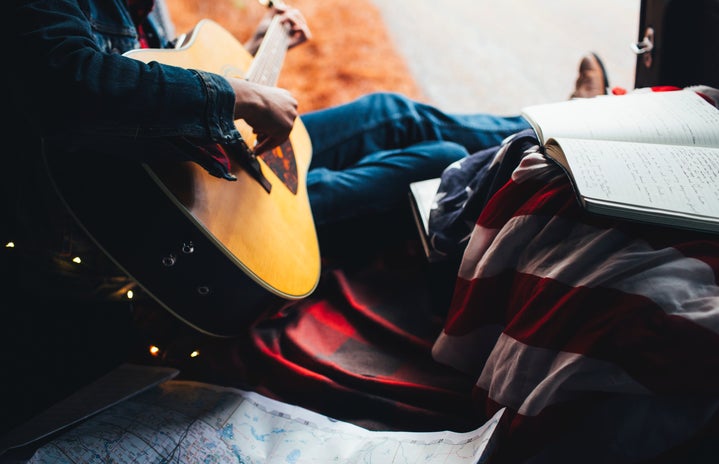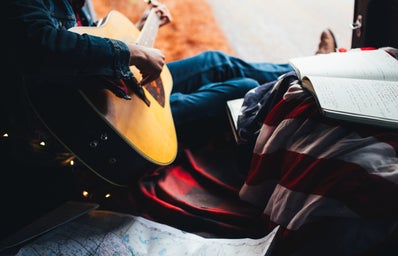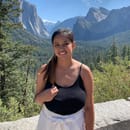“Oh, you’re very talented, I just think that this would be a hard sell. Have you ever thought about doing pop or R&B?” This statement was all too familiar to southern soul artist Rissi Palmer, who heard this a lot when searching for record deals at a young age.
Growing up listening to country among other genres, Palmer, now 39, cites artists like Dolly Parton and Patsy Cline as inspirations for pursuing a career in country music. But Palmer did not see a lot of Black artists, like herself, in country music growing up. “I think that people underestimate the value of being able to see yourself in whatever it is that you want, that you aspire to do,” she says.
Palmer made her country music debut in 2007 with her song “Country Girl.” The song became the first country song by a Black female artist to make it on the Billboard Country Singles Chart since Dona Mason’s “Green Eyes” in 1987. That’s a 20-year gap.
When speaking about Black artists in country, people often think of Charley Pride or Darius Rucker and stop there. But Black women like Linda Martell, the first Black woman to chart a country hit, The Pointer Sisters and Dona Mason also had prominence in the genre. The conversation about Black artists in country music was revived in 2019 when Lil Nas X’s “Old Town Road” burst onto the scene. The song became controversial because Billboard originally refused to recognize it as a country song due to its hip-hop elements. Many fans online felt like Lil Nas X’s race played a factor in the decision.
When people say country, the immediate image that comes to mind is often of a white person singing about trucks and fishing but Palmer wants to remind people that there’s more to country than what’s on mainstream radio, where those types of songs are heard. “There is so much good country music being made. That may not necessarily make it to your local radio station, but it’s still happening,” she says.
Black people are responsible for creating almost all music genres known today-jazz, disco, funk, etc.-but oftentimes Black artists are only talked about when making R&B or hip-hop music. A Black artist could be making pop music but because of the colour of their skin, they tend to be boxed into the R&B or urban genre. For example, Tinashe started her career making pop music but was often marketed as an urban star, hindering her artistry to the point where she eventually decided to just become an independent artist.
In the wake of the Black Lives Matter movement, major labels like Republic Records and Warner Music Group Corp. decided to stop using the term “urban” as they felt this contributed to the pigeonholing of Black artists. The term descended from the category of race records, code for music made by Black artists. This was a marketing tool used by early 20th-century record companies to market records to a Black audience. Hillbilly records was the white equivalent of this, with country music being lumped into the category. Not much change has come from the removal of the term urban. Outside of the labels, this pigeonholing continues in the popular music industry award shows, like this year’s VMAs where The Weeknd’s “Blinding Lights” won the best R&B category, despite the song being pop.
David “Click” Cox, former A&R and now president of his own entertainment consulting firm CLK Creative Works, says that in addition to the pigeonholing of Black artists into certain genres of music, Black artists are also pigeonholed in terms of the topics they’re allowed to tackle. “Rappers always seem to get pigeonholed to have to do a certain thing and to carry on a certain facade,” Cox says. “[It’s] harmful to the industry because it paints a picture of what Black people as a whole may look like to the individuals who don’t interact with a lot of Black people.”
In August, Cox, along with Ian Andre Espinet, was a co-host for a 10-part series called Breaking Down Racial Barriers. The series was presented in partnership with the Canadian Independent Music Association and ADVANCE, a Black music collective launched to help support Black people in the music business. A conversation between music industry professionals from all sectors, the series tackled various topics with regards to anti-Black racism in the industry and as a result, a report highlighting the issues and information spoken about in the series will be written up. Cox hopes that the report will allow the Canadian music industry to reflect on how they have been complicit in keeping the industry white and work on fixing it.
Palmer believes that the evolution of the genre and the industry, the way country music was marketed and racism are some factors that have disadvantaged Black country artists from becoming mainstream. “We’ve come to accept what’s really just racism and it’s a hard thing to change,” she says. “I think that’s why it’s taken so long and why there have been so few artists of colour.”
She points out that the pigeonholing of Black artists is something that everyone, regardless of race, can fall prey to because she believes it comes down to marketing and how it’s easier to package what’s familiar. “There isn’t a template yet for a Black woman superstar in country music,” she says. “I think people always tend to lean towards the path of least resistance and I don’t think people even recognize it as racism sometimes.”
Cheryl Thompson, a creative industries professor at Ryerson University, believes that a large part of genres being seen as either Black or white is due to the way they’re regulated. Using hip-hop as an example, she says the popularity of the genre has caused it to become commercialized and watered down. She also adds that the prominence of Black men in the genre, who might struggle to gain complete autonomy over their work, is another contributing factor. As a result she says this makes it harder for artists to be authentically Black. “Authentically Black means oppositional…critical [and] maybe confrontational,” she says. “You can do that and have an underground following. But if you’re really trying to get paid and make a living and be really wealthy…that type of artist really has a hard time today.”
Palmer doesn’t consider herself to be a full country artist anymore. She describes her music as being closer to southern soul because it encompasses a variety of genres like country and R&B. “I don’t feel like country is a completely accurate description of what it is that I do,” she says. She also has not been in the country music scene for a decade. This has allowed her to set her own rules. “Being an independent artist, you have all the autonomy in the world,” Palmer says. “I don’t feel beholden to call myself any one thing…my music is what it is.”
On her latest album Revival, Palmer tackles a lot of heavy topics. Her song “Seeds” was written in 2014 but the video, released two years ago, highlights the issues of police brutality and children being locked in cages. Despite this, she wasn’t afraid to release the video and speak up for the things that she’s passionate about. She also doesn’t take offense to listeners who decide to stop streaming her music because of it. “If you don’t have a problem with police brutality [and] children in cages, then we really don’t have anything in common,” she says. “So it’s probably for the best they split at this juncture.”
Apart from making music, Palmer is also the host of Apple Music radio show Color Me Country, named after Martell’s 1970 album. Wanting to be remembered as a champion for all artists, Palmer’s radio show focuses on spotlighting people of colour in country music. The idea came to her during the whole “Old Town Road” debate. She started a Twitter thread highlighting all of the Black women that she knew had charted in country music and from there people engaged with it and added their list of artists. The pandemic presented her the perfect opportunity to develop it into a podcast.
A week away from releasing the first episode, Palmer got a referral to Apple Music, resulting in her original idea being amplified and turned into what it is now. Regardless of whether Apple Music will back a second season or not, she plans on continuing the show anyway. Her first season is focused on women of colour in the industry because she feels like they are still invisible for the most part. “Just look at the landscape right now, in the mainstream, there is only Mickey Guyton,” she says. “And when I was out, there was only me.”
This project is what she’s most proud of currently because she gets to share her advice and be the person she didn’t have when she was getting started in the industry. “It was really important to tell those stories and to contradict this idea that we don’t have a stake in country music, we’re not a part of the roots of it and we’re not interested in it,” says Palmer. “Because we very much are.”


